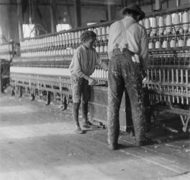Rediscovering the Purpose of Family
Blog / Produced by The High Calling
Nearly 200 years ago, people didn’t juggle work and family like we do today. The Industrial Revolution was just gearing up, and the first factories employed whole families: men, women, and children. For centuries prior, families and households had been viewed as the production unit of society. So that is how the first factories worked too.
Consider this family contract from 1814 referenced in America's Families:
Dennis Rier of Newbury Port has this day engaged to come with his family to work in our factory on the following conditions. He is to be here about the 20th of next month and is to have the following wages per week:
Himself: 5.00
His son Robert Rier 10 years of age: .83
Daughter Mary 12 years of age: 1.25
Son William 13 years of age: 1.50
Son Michael 16 years of age: 2.00
His sister, Abigail Smith: 2.33
Her daughter Sally, 8 years of age: .75
Son Samuel 13 years of age: 1.50
House rent to be from $20 to $30. Wood cut up $2 per cord.
Obviously, Dennis Rier had bigger problems than balancing work and family. His ten-year-old son and his eight-year-old niece were living an Oliver Twist-style childhood. Before factories, families had worked together in their homes or fields where they controlled their own work environment. Now, the work environment replaced the home. In fact, the factory owned Dennis Rier’s home. You could argue that they owned his entire family.
Over time, the work of the Industrial Revolution focused less on the productivity of families and more on the productivity of an individual’s career. Household members were now productive only as a group of potential employees who pooled their individual earnings. If a woman could afford to stay home to continue the traditional household tasks, she did. However, society itself made many of these tasks obsolete. Homemade candles were replaced by electricity, medical care by medical professions, educating children by public schools, making cloths by the garment industry, and on and on.
The family no longer made and grew their daily bread together. One member was supposed to go outside the family and earn a wage to support the rest of the family.
Separation of Work and Family
The world of work and family slowly separated from one another. The home was a place to get away from work instead of being a place where work took place. This idea of separation between work and home became the norm. Women often thought of themselves as the pillars of morality and viewed work as a dangerously immoral place, so they made a home that would save their husbands from the destructive forces of the work world with religious and family values.
As the world of work changed, our ideas of family changed with it.
By the mid twentieth century, the family was still the basic unit of the United States economy, but it had been flipped upside down. The value of a family was no longer its potential for economic production but its potential for economic consumption. Family members pooled their income and drew from the economic pot to make large purchases like cars or houses. They coordinated their spending and their work in order for the family to function effectively.
Changes Reshaping Family Life
The majority of families in America have been under economic stress in recent decades. These economic changes, along with social changes, are reshaping family life. Once again, more and more women are adding real economic value to their families.
The modern family of George Jetson and Fred Flintstone is dying out. Most families no longer live on a single income, in part because family wages are not as common. The 21st century family is struggling to define itself against the dramatic and stressful changes in our society.
The demands of the 21st Century are different than those of the 20th. The global economy requires parents to continually update skills or change occupations. The explosion of new media makes it difficult for parents to control what their children see. As a result of all this change and uncertainty, many people today struggle to understand what a family is.
What is a Family?
Thankfully, Scripture reminds us. As Christians, we are adopted into God’s family. This means the will of the Father is more important than the will of the family. If a family exists to serve itself, it will crumble under its own weight. Instead, we exist to serve God and glorify him in our daily lives—in our work, in our families, and in our communities. In the past, work and family overlapped much more than they do today. But changes in our workplace environments or society’s understanding of family do not change our adoption into the family of God.
Our purpose in families is no different than our purpose in work. We work to honor God by demonstrating his love to those around us, whether they have experienced that love or not. Our family relationships exist for the same reason. We share God’s love with people in our community who may not know God—neighbors and friends and others. We share God’s love with people in our family who may not know Him—from little junior to Mom or Dad. And of course, we share God’s love with those who already know Him, as an encouraging reminder to them of God’s faithfulness and goodness. Whatever economic or societal changes come our way, however we adjust our understanding of families over time, every family exists to honor God and share his love with the world.
Image by Lewis Hine. Used with permission. Sourced via Wikimedia Commons.











